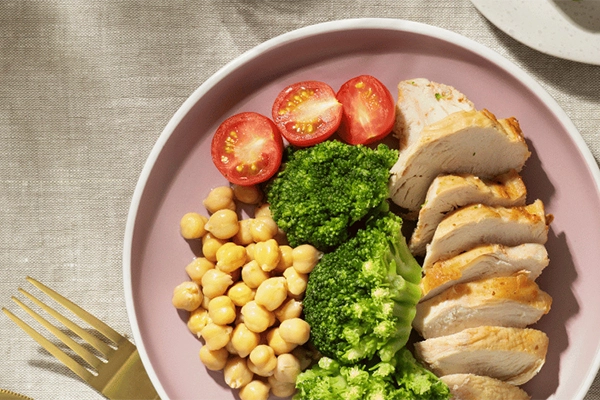Topics
What is insulin resistance?
Insulin is a hormone that is secreted by the pancreas. Its primary role is to regulate blood sugar levels in your body.
Insulin resistance is the inability of muscle, fat, and liver cells to respond to insulin and absorb glucose from your blood. Therefore, your pancreas produces more insulin to facilitate glucose entry into your cells.
People with insulin resistance are often diagnosed as prediabetics, which can lead to type 2 diabetes mellitus (T2DM). Patients with diabetes are also at risk for developing other chronic illnesses such as heart disease, kidney disease, stroke, infected extremities and erectile dysfunction (men).
Am I at risk?
Insulin resistance may result in:
- Type 2 Diabetes Mellitus
- Non-alcoholic fatty liver disease
- Cardiovascular Disease
- Polycystic Ovarian Syndrome (PCOS)
- Metabolic Syndrome
Insulin resistance can affect anyone. However, insulin resistance is more common in those with certain risk factors, such as genetic and lifestyle factors.
What should I limit?
-
Limit food and beverages with high sugar content.
An excessive sugar intake will worsen insulin resistance, which comes with not-so-sweet complications!
- Limit added sugars to 36 grams (9 teaspoons) for men and 24 grams (6 teaspoons) for women per day. To illustrate the above, there are 37 grams (7.4 teaspoons) of added sugar in a can of Coke, whereas kuih lapis has 5-7 grams of sugar per serving.
- Swap your kuih-muih or bubble tea cravings with refreshing fruits!
- Make it a habit to always read the ingredient list at the grocery store before buying an item.
- Another alternative is to opt for ‘kurang manis’ or ‘kosong’ the next time you go to your local mamak. You can still enjoy your favourite drinks!
-
Limit consumption of red and processed meat.
- Consuming red and processed meat regularly can increase your risk of developing insulin resistance, resulting in obesity and type 2 diabetes mellitus.
What should I eat?
What does a balanced meal look like?
-
Eat your veggies.
- A fibre-rich diet (20-30g of fibre/day) has been found to reduce the risk of insulin resistance.
- Load up your plate with vegetables and fruits! They contain many micronutrients which nourish your body.
-
Eat complex, unprocessed carbohydrates.
- Swap white rice with brown rice, choose oats over cereal, and opt for wholemeal bread instead of white bread.
- Complex carbohydrates stabilise your blood sugar levels, thus preventing ‘sugar crash’.
- Learn more about how much carbohydrates you should be eating here.
-
Eat your protein.
- Healthy proteins such as lean meat, poultry, fish, and tofu keep us fuller for longer. By doing so, your overall calories intake will reduce.
- Salmon, mackerel, tuna, and sardines are rich in omega-3 fatty acids and can be beneficial for your heart health.
- Learn more about how much protein you should be eating here.
What else should I do?

Other things to take note of include:
Stay hydrated
Remember to drink enough water. Learn more about the importance of hydration here.
Exercise
It is recommended to exercise for at least 30 minutes every day. You can get creative, for example, go for a hike during the weekends, a spin class, or a variety of workouts on YouTube.
Did you know that 7-10% weight reduction can provide prevention against type 2 diabetes mellitus? By exercising regularly and consuming lesser calories in a healthy way, you can keep your weight in check, which in turn reduces your risk of getting insulin resistance.
However, it is crucial not to drastically reduce your calories intake, as this can lead to a sudden drop in your metabolism.
Make an appointment at Pantai Hospitals
If you or your loved one is at risk of insulin resistance, contact your doctor and the team of dietitians at your nearest Pantai Hospital about your daily nutrition requirements.
To make an appointment for health screening, please contact the health screening centre at the Pantai Hospital nearest to you.
Pantai Hospitals have been accredited by the Malaysian Society for Quality in Health (MSQH) for its commitment to patient safety and service quality.
References
- Ministry of Health Malaysia. National Health & Morbidity Survey 2019: Non-Communicable Diseases, Healthcare Demand and Healthcare Literacy. Available at http://iptk.moh.gov.my/images/technical_report/2020/4_Infographic_Booklet_NHMS_2019_-_English.pdf [Accessed on 12 September 2022]
- Diet tips to improve insulin resistance. Available at https://www.medicalnewstoday.com/articles/316569#foods-to-avoid [Accessed on 12 September 2022]
- National Diabetes Registry Report 2020. Available at https://www.moh.gov.my/moh/resources/Penerbitan/Rujukan/NCD/Diabetes/National_Diabetes_Registry_Report_2020.pdf [Accessed on 12 September 2022]
- Dietary sugars intake and cardiovascular health: a scientific statement from the American Heart Association. Available at https://pubmed.ncbi.nlm.nih.gov/19704096/ [Accessed on 12 September 2022]
- Facts About Sugar. Available at http://www.myhealth.gov.my/en/facts-about-sugar/ [Accessed on 12 September 2022]
- Diet Tips for Insulin Resistance. Available at https://www.healthline.com/health/diabetes/insulin-resistance-diet#diet-tips [Accessed on 12 September 2022]
- Prevention or Delay of Type 2 Diabetes: Standards of Medical Care in Diabetes—2019. Available at https://diabetesjournals.org/care/article/42/Supplement_1/S29/30884/3-Prevention-or-Delay-of-Type-2-Diabetes-Standards [Accessed on 12 September 2022]







.webp?sfvrsn=9f42ecac_9)
.webp?sfvrsn=2984d0c3_9)



